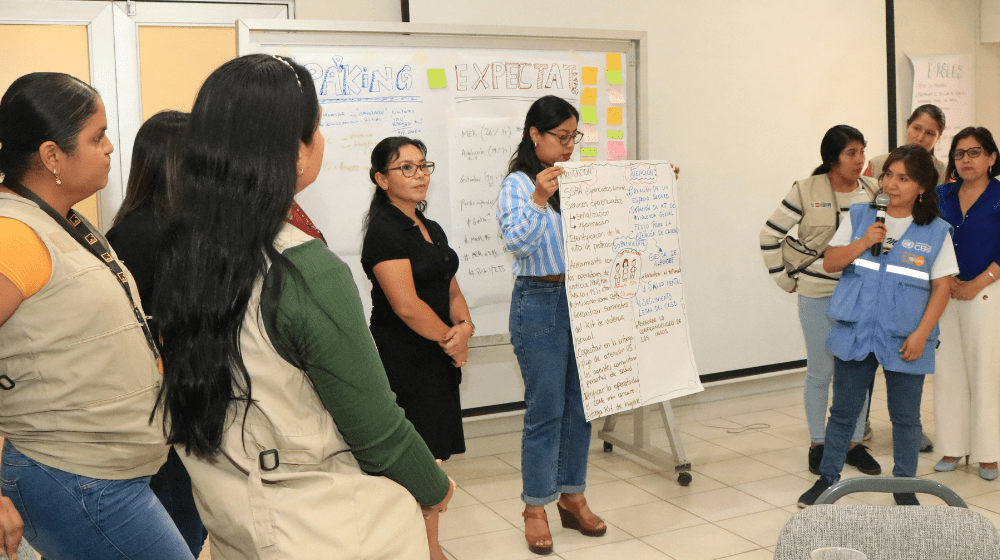On the International Day for the Prevention of Teenage Pregnancy, over 40 representatives from local institutions in the Piura region participated in an important training workshop on the Minimum Initial Service Package (MISP) for sexual and reproductive health in emergency situations. This activity took place as part of the actions to strengthen the capacities of personnel and allies from strategic institutions in the region within the context of the climate crisis response project implemented by the United Nations Population Fund (UNFPA) in Peru, with funding from the Central Emergency Response Fund (CERF).
The main objective of this workshop was to raise awareness about national and health regulations related to care in emergency situations. It also aimed to explain the importance of implementing the MISP in such situations, describe the key elements of this package, and its approach in a rapid needs assessment.
The event involved representatives from institutions such as the Regional Health Directorate of Piura, the Morropón Huancabamba Regional Health Directorate, the Submanagement of Social Development of the Regional Government of Piura, the Women's Emergency Center, health centers in Los Algarrobos and Santa Julia, the Municipality of Veintiséis de Octubre, CESAMICA, the Subregional Directorate of Health, and the Health Subregion of Morropón. It also featured representatives from international cooperation organizations such as the International Organization for Migration (IOM), the International Rescue Committee (IRC), and Save the Children.
The workshop was conducted by Juan Pablo Protto, regional advisor on Sexual and Reproductive Health in emergency contexts at UNFPA, and had the support and technical assistance of the organization's field team.
What Are the Minimum Initial Service Package (MISP)?
The Minimum Initial Service Package (MISP) for Sexual and Reproductive Health is a set of priority and coordinated activities aimed at saving lives that must be implemented at the outset of an emergency. However, it is necessary and advisable that these services can be worked on, coordinated, and validated both nationally and locally in the preparatory phases prior to an emergency.
The MISP promotes the exercise of the fundamental right to health, focusing on improving access to essential services and priority supplies for sexual and reproductive health. This is done under a rights-based, gender-sensitive, and multicultural approach, paying special attention to women, adolescents, and the most vulnerable children affected by emergencies. Likewise, actions are promoted to ensure that the community is aware of the existing services, has adequate and timely information, and adheres to life-saving prevention and care measures in sexual and reproductive health.
The MISP focuses on various areas, including preventing maternal and neonatal morbidity and mortality, reducing the transmission of HIV, preventing and treating the consequences of sexual violence, preventing unintended pregnancies, and planning comprehensive reproductive health services.
The Training Process
The training and updating process on the MISP aims to intensify, through direct technical assistance to countries, the better understanding and operationalization of the 6 objectives of the MISP6 package for sexual and reproductive health in emergency contexts.
This training seeks to strengthen the capacities of the various national and local actors involved in the health response within the Minimum Initial Service Package (MISP) for Reproductive Health in emergencies. Some of the specific objectives of this training include improving technical knowledge about the MISP and the objectives it addresses, enhancing managerial skills to implement the MISP promptly in emergency contexts, presenting various existing tools to implement the MISP, and establishing a roadmap of priority actions towards better preparation and response of the MISP in emergency situations. Furthermore, it aims to generate exchanges of experiences and learnings that allow the strengthening of practices adapted to the existing contexts and mechanisms.
It is worth noting that similar workshops will be held in October in two other regions where the project is being implemented: Lambayeque and Tumbes. This way, it is expected to further strengthen capabilities and knowledge in emergency situations to ensure an adequate and effective response in sexual and reproductive health.


